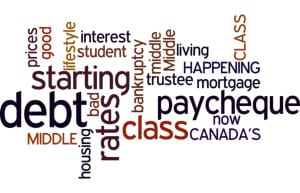 What defines the middle class in Canada?
What defines the middle class in Canada?
Canada’s newly elected federal Liberal government wishes to show what defines the middle class in Canada. It has plans to raise income taxes on the wealthy; but what does that really mean and what effect, if any, will it have on Canada’s middle class? Canada’s middle class has really been struggling and this is a plight that we have discussed in several blogs.
- Canada’s Middle Class: Do you Qualify?
- The New Economic Attack is on Canada’s Middle Class
- Household Debt; Canadian Levels Sound Alarm Bells
The Canadian Centre for Policy Alternatives Report
There is a new report out by the Canadian Centre for Policy Alternatives (CCPA). Canada “has become a low-tax jurisdiction for the affluent compared to the U.S.,” the report says. It found that the average top marginal tax rate in the U.S., when combining federal and state taxes, is 47.9 per cent. In Canada, the average combined federal and provincial rate is 45.7 per cent. “In fact, during Canada’s high growth years between 1940 and 1980, the top marginal income tax rate was well over 70 per cent. … Our federal government used to ask more of Canada’s richest one per cent. There are plenty of reasons to do so again.”
Will the campaign trail have been what defines the middle class in Canada?
Prime Minister Justin Trudeau campaigned to create a new tax bracket for Canada’s highest earners (the top 1% who earn over $200,000 per year). He stated it in every debate and he made it an important part of politics. He differentiated himself and the Liberal party from Stephen Harper and the Conservative party on this issue. It was always front and centre in the Canadian federal election 2015.
He proposed raising the top federal tax rate to 33%. It is presently at 29%. And he promised to lower taxes slightly for middle earners; however he did not define what he meant by lowering taxes slightly. So does he even know what defines the middle class in Canada?
The middle class may still not be better off under the Liberals
The study by the CCPA doesn’t agree with the number that Prime Minister Trudeau is proposing. Instead the CCPA believes that Canada’s 1% should have a federal tax rate of 65%. They estimate that this would amount to an extra $27,700 in taxes, on an average income of $289,000. The CCPA’s argument is that the 65% rate would bring in an additional $15.8 billion to $19.3 billion in revenue annually. With this money Canada could potentially provide free post-secondary education and cover the costs of infrastructure projects. Of course as you can imagine this is a hotly contested subject with no definitive answers.
The reality is that Canada’s middle class is still struggling. It’s difficult to consider the plight of Canada’s 1% when most Canadians are living paycheque to paycheque. Unless Prime Minister Trudeau will direct some of the new tax revenue into programs that directly help Canada’s middle class, I doubt that it is new infrastructure projects and free post-secondary education (even for children of the 1%?) that anyone wants to be the new Canada middle class definition, or to be what defines the middle class in Canada.
Do you have too much debt and are living paycheque to paycheque?
If you are struggling financially and feel overwhelmed by mounting debts, there is help out there. Contact Ira Smith Trustee & Receiver Inc today. With a solid financial plan and immediate action we can help put your financial worries behind you Starting Over, Starting Now.









